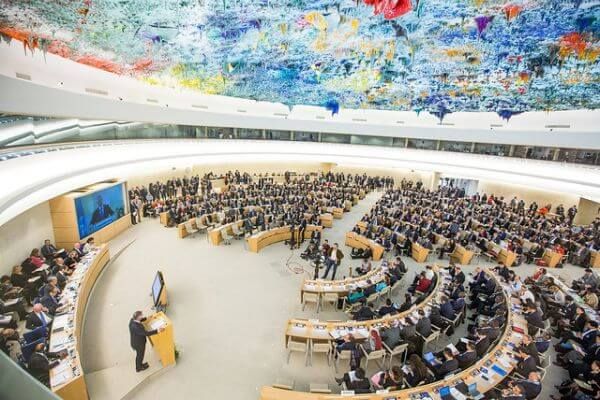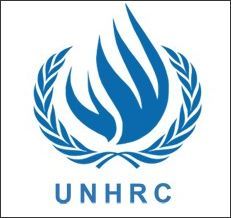The United Nations Human Rights Council (UNHRC) has a history of obsessive anti-Israel bias at the cost of other far more pressing international human rights concerns. Dov Lipman examines the UNHRC’s Israel obsession.
The concept behind the creation of a United Nations Human Rights Council (UNHRC) to serve as an international body that protects human rights around the globe is a wonderful idea.
In theory.
In reality, this body ignores horrific human rights violations and falsely focuses its attention on Israel.
Join the fight for Israel’s fair coverage in the news
UNHRC’s obsession quantified
Let’s begin with a few facts and figures.
In the first year of its existence, 2006, the UNHRC condemned human rights violations in just one country – Israel. On June 30, 2006, the Council passed a resolution in which it “decides to undertake substantive consideration of the human rights violations…of the Israeli occupation of Palestine.” On July 6, the Council condemned Israeli military action in Gaza, expressing “deep concern at the breaches by Israel…of international humanitarian law and human rights law…”
The Council then broadened the condemnation and expressed “grave concern at the violations of the human rights of the Palestinian people caused by the Israeli occupation…” It even decided to “dispatch an urgent fact-finding mission” to monitor Israel’s actions. On August 11, 2006, the Council condemned “Israeli military operations in Lebanon, which constitute gross and systematic human rights violations of the Lebanese people…” and the Council declared that it is “Appalled at the massive violations of the human rights of the people of Lebanon by Israel.”
The pattern continues with five more condemnations of Israel in the first year of the Council’s existence!
And yet, the UNHRC somehow managed to ignore ALL the atrocities occurring in some of the other 191 countries in the world. For example, in 2006, the Indian army opened fire at peaceful protesters at Kakopathar in Assam and at least ten people were killed. Was the violation of the human rights of these innocent people, murdered by the Indian army, not worthy of a condemnation by the UNHRC?
The Council also managed to avoid condemning the government of Sri Lanka for the June 17 Pelasi Church attack in which government troops shot at houses and at Our Lady of Heart Church in Mannar, killing six civilians and injuring at least 47. They similarly said nothing about the August 14 Chencholai bombing when the Sri Lankan Air Force bombed what it said was a rebel camp, killing 61 girls aged 16 to 18. Were their human rights not violated?

Quite amazingly, while the Council managed to condemn Israel eight times that year, it did not condemn those who attacked Israel during that same time period. For example, on April 17, 2006, a Palestinian suicide bomber walked into a restaurant in the heart of Tel Aviv and detonated himself, killing eleven people ages 16 to 73, and injuring 70. Why wasn’t the Palestinian leadership, which called the attack an act of “self-defense,” condemned for allowing and encouraging such human rights violations?
During its second year of operations, the Council condemned Israel five more times. It should be noted that in that second year the Council did manage to find one other country to criticize when it “deplored” the situation in Myanmar – a resolution which only passed in the Council after it removed the word “condemn” from the text. The Council could not “condemn” Myanmar which, according to the official Human Rights Watch report of that year, was denying its people “basic freedoms” and that “restrictions in the internet, telecommunications, and freedoms of expression and assembly sharply increased in 2007. Abuses against civilians in ethnic areas are widespread, involving forced labor, summary executions, sexual violence, and expropriation of land property.”
And yet the UNHRC had no problem outright condemning Israel five times when Israel is not guilty of any of the abuses listed above!
This blatant anti-Israel bias continued and over the Council’s first decade, it condemned Israel 62 times while issuing just 55 condemnations for the rest of the world combined.

UNHRC’s members
The Council’s lack of true concern for human rights violations around the world and its single-minded focus against Israel became most conspicuous in June 2007 when its members voted 46-1, to make Israel’s actions a permanent item on the Council’s agenda. From that point and onward, every meeting of the UNHRC includes Item #7 on the agenda: Israel and its “human rights violations.” The United States, Australia, and numerous European countries have been critical of the Council for this fixed agenda item, noting that the Council does not scrutinize countries with far worse rights records than Israel. (In June 2018, the United States pulled out of the UNHRC because of its anti-Israel bias, labeling the organization as “a cesspool of political bias.”)
The final dimension of the UNHRC farce are the countries which have been allowed to sit on the 47-member council. Just to give one example, in 2017, the Democratic Republic of Congo and Angola were given seats on the Council. Angola and the DRC are countries known for gender-based violence, restrictions of freedom of expression, harassment of opposition leaders, lack of fair and free elections, suppression of freedom of assembly, discrimination against women, minorities, and people with disabilities, and persecution of the LGBT community.
Part of the mandate of the UNHRC is to “address important thematic human rights” such as “freedom of assembly, freedom of expression, freedom of belief and religion, LGBT rights, and the rights of racial and ethnic minorities.” How can they have been given the reins to monitor and condemn human rights violations around the world if they are in constant violation of those rights as outlined by the UN itself?
This stands in stark contrast with Israel where there is complete freedom of speech, freedom to protest, religious freedom, full equal rights for women, LGBT rights, open and fair democratic elections, and laws protecting women, minorities, and people with disabilities from discrimination.
* * *
Yes, Israel is involved in a complex conflict with the Palestinians and sadly, in conflict, innocent people die. But as British Colonel Richard Kemp testified to a special session of the UNHRC in 2009, “”During Operation Cast Lead, the Israeli Defense Forces did more to safeguard the rights of civilians in a combat zone than any other army in the history of warfare.”
The United Nations Human Rights Council will likely continue to condemn Israel on a regular basis while, sadly and tragically, ignoring human rights atrocities happening all around the world. Intellectually honest people who know the facts and see right through its clear anti-Israel bias just have to know to simply ignore the UNHRC and its meaningless declarations and condemnations.
Dov Lipman was elected to the 19th Knesset in January 2013 and currently serves as Senior Manager – Community Outreach for HonestReporting.
Image of UNHRC meeting CC BY-NC-ND UN Photo;

